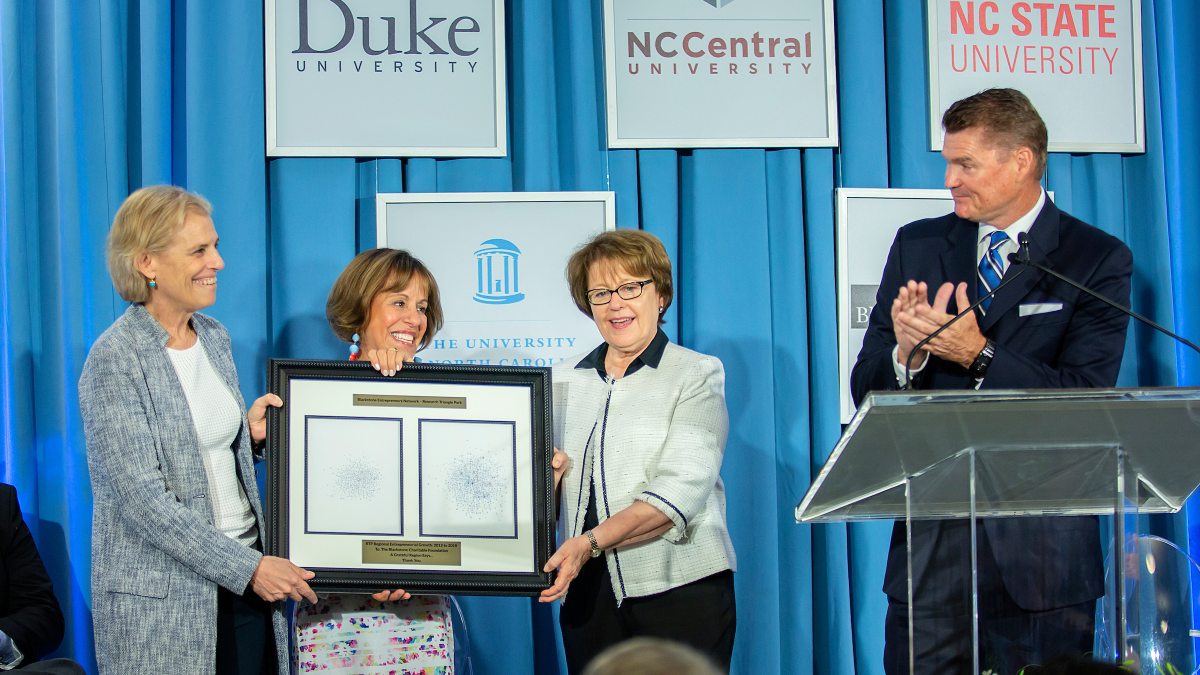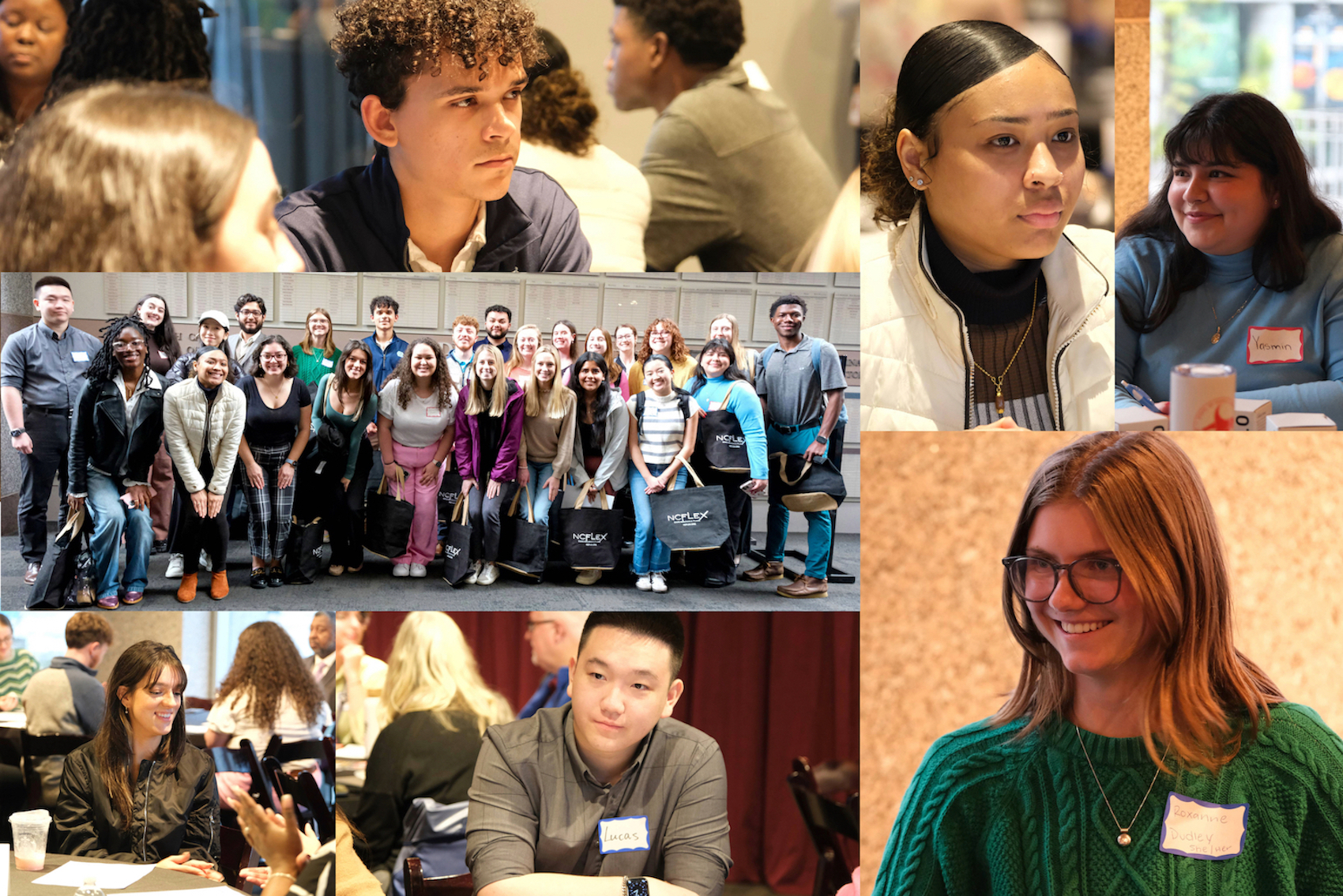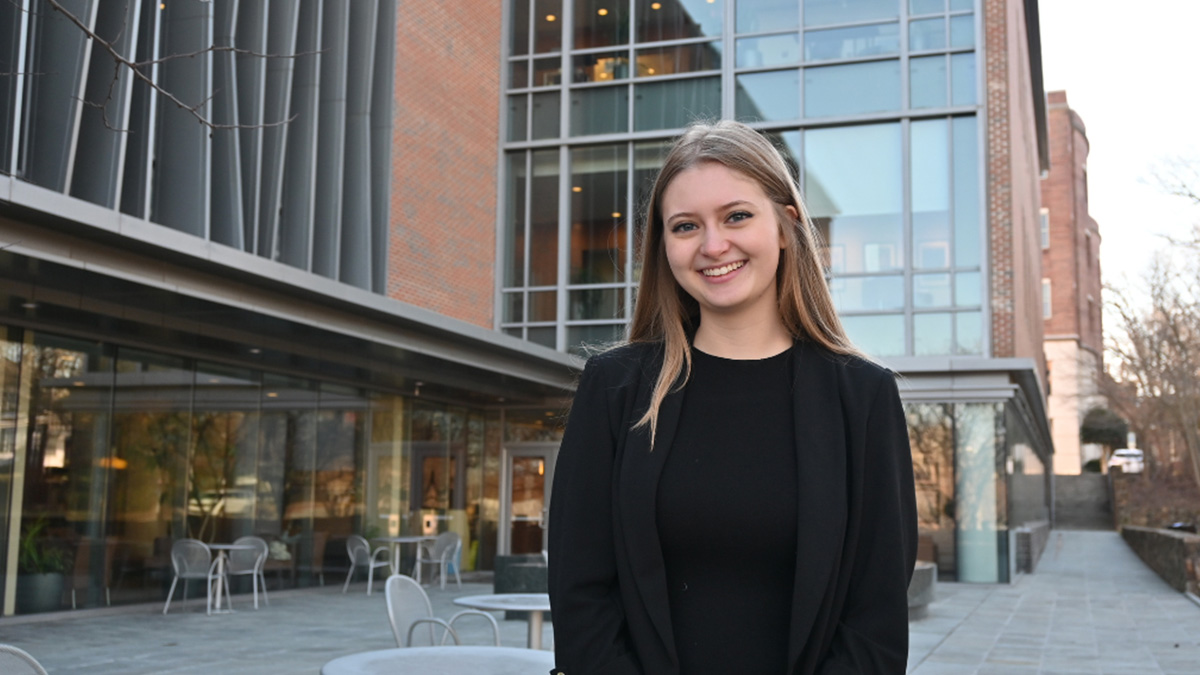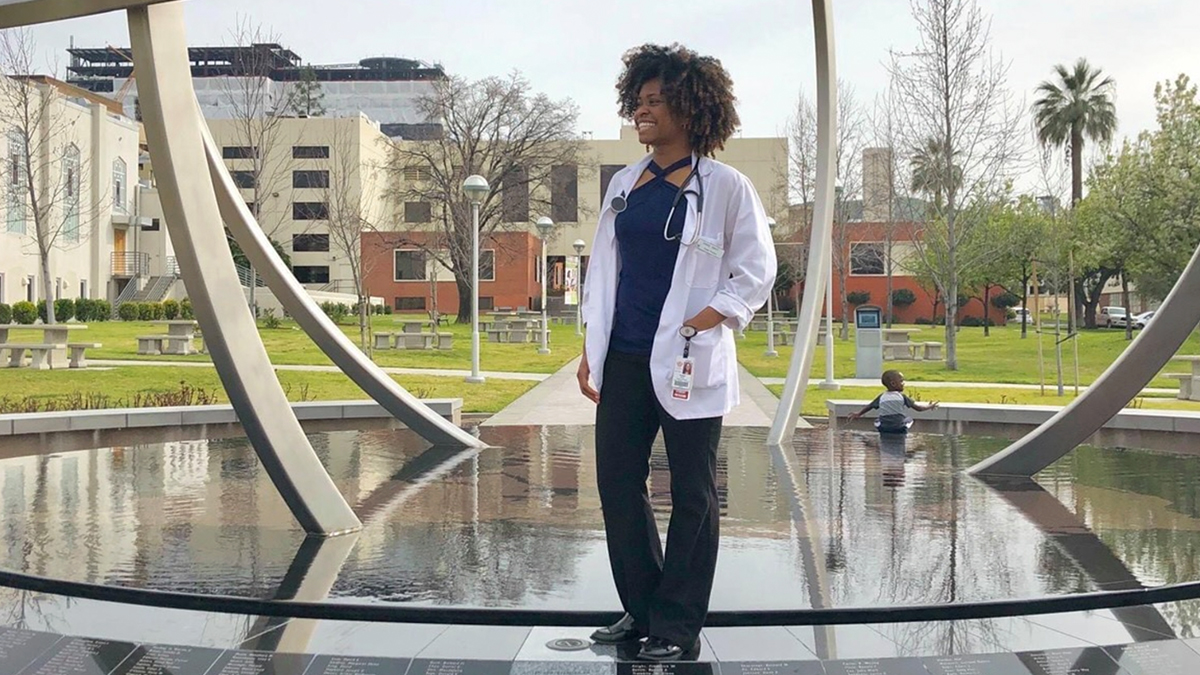Blackstone celebrates RTP partnership, foundation for future growth
For six years, the organization focused on finding Carolina students and faculty members with bright ideas and connected them to experienced entrepreneurs and investors.

After six years, 250 local companies mentored and more than $430 million in capital raised by these companies, the Blackstone Entrepreneurs Network–RTP celebrated these accomplishments at a Carolina campus event July 20.
The network, a partnership Carolina made with three other Triangle universities and the Blackstone Charitable Foundation, not only has accomplished what it set out to achieve in the Research Triangle Park, but the foundation has also used that success to prove that these results can be replicated in other communities.
“This is where it all started for me,” Amy Stursberg, executive director of the Blackstone Charitable Foundation, told a standing room only audience at Hyde Hall. A public servant for much of her career, including a stint as director of the $500-million September 11th Fund in New York City, Stursberg had never worked with starting businesses before coming to Blackstone. She recalled starting out with only one other employee and “micromanaging and stalking” entrepreneurs and university experts as a crash course in startup development.
“The Research Triangle Park was really all our lessons learned, even the things we shouldn’t do,” Stursberg said. “We now have these programs all over the country that are about collaboration and ecosystem building, but it all started here.”
Other speakers at the event included Chancellor Carol L. Folt, Vice Chancellor for Innovation, Entrepreneurship and Economic Development Judith Cone and Bryan McGann, executive director for Blackstone Entrepreneurs Network–RTP.
“We have a dual connection to both innovation and public service, and they go hand in hand,” Folt said in her remarks. “The people that do these things are often the same people. They’re doing public good and building thriving companies to really reinvest in the communities that we care so much about. This is a beautiful blending.”
As examples of the network’s success, Cone invited two RTP entrepreneurs to tell their stories. Scott Bolin, the first fellow at the Blackstone RTP network, went on to found Tethis, a company that has developed environment-friendly superabsorbent polymers to make items like disposable diapers biodegradable.
Rahima Benhabbour, a faculty member in the Eshelman School of Pharmacy and the UNC and N.C. State Joint Department of Biomedical Engineering, founded AnelleO to make the first 3-D printed intravaginal ring designed to treat a women’s health condition.
Bolin called the rigorous process of startup vetting a “meatgrinder” and Benhabbour compared her experience to a “rollercoaster ride,” but both agreed that they couldn’t have launched their companies without the network’s connections.
Disconnected ecosystem
The Blackstone Charitable Foundation came to North Carolina in 2011, as the nation and the state were recovering from the devastation of the 2008 recession. The foundation, as part of its larger mission to inspire entrepreneurship around the globe, brought a different approach to economic development, one that focused on finding individuals with bright ideas and connecting them to experienced entrepreneurs (for advice and guidance) and investors (for funding).
“Supporting entrepreneurship and innovation is an impactful way to spur job creation and has the ability to lift entire communities,” Stursberg said. “The work of the foundation, including our efforts in North Carolina, is a natural extension of the firm, helping provide businesses with what they need to grow.”
The Research Triangle Park was a perfect place to put this approach to action. The Triangle already boasted a high concentration of universities with researchers eager to get their discoveries and innovations into the hands of the people who needed them.
“North Carolina has a rich history of citizens investing in its universities because people in our state understand that the innovations created by great minds at these institutions make a human and economic impact,” Cone said, adding that one way of paying back that investment and serving the public is “using the vehicle of startups” to deliver helpful products or services and create jobs.
But there was a glitch. Great researchers often lacked the business knowledge and business connections needed to succeed in a competitive marketplace.
“Research through Kenan-Flagler Business School and Judith Cone’s office showed that, at the time, there were gaps in our ecosystem that, if filled, represented major opportunities for entrepreneurial growth,” McGann said.
That was the kind of “nascent entrepreneurial ecosystem” Blackstone wanted to help, said foundation Vice President Tony Tolentino. “We look for regions that are on the cusp of doing something big and special, where our program could help move the needle.”
So, starting with a $3.63 million gift, the foundation created the Blackstone Entrepreneurs Network—RTP in partnership with Carolina, Duke, N.C. State and N.C. Central universities and the Council for Entrepreneurial Development.
“It was a tremendous honor for us to have the foundation make this investment,” said David Routh, vice chancellor for University Development at Carolina. “They had a vision to make a difference in the economic life of our community, and the impact of their generosity has since made a difference in the individual lives of many of our community’s citizens.”
Free advice
In 2012, the network established a well-connected team of 15 entrepreneurs-in-residence to identify promising startups and help them grow. Collectively, these experienced, serial entrepreneurs had founded 46 companies, employed more than 5,000 employees, raised over $1 billion for companies they founded and another $4.2 billion for other companies.
“The Blackstone Entrepreneurs Network has served as a turbocharger for the regional network of entrepreneurs,” said Ted Zoller, Carolina business professor and director of the Center for Entrepreneurial Studies.
Local startups enter the network as “mentored companies,” meeting with an entrepreneur-in-residence monthly to achieve significant business milestones. The startups also receive help from Blackstone fellows, such as local university MBA, law and doctoral students who provide support in financial modeling, market research, competitive analysis and due diligence.
After completing certain goals, mentored companies may become “portfolio companies,” gaining access to sector experts, venture coaches, angel investors, and administrative and marketing support provided by the network.
The network maintains an average of 50 mentored companies and 12 portfolio companies at any one time. The network also sponsors and participates in regional entrepreneurship events, panels and conferences, strategic partnerships and community outreach. For all this help, Blackstone doesn’t charge these companies any fees and does not take equity in the companies.
Spinout success
One of the network’s many success stories is Bivarus, a Carolina spinout that provides real-time patient feedback to healthcare providers via smart phone and email. The founders of Bivarus are Seth Glickman, president and executive medical director of the UNC Health Alliance and an associate professor of emergency medicine at Carolina, and Kevin Schulman, a professor of medicine and business administration at Duke University.
“Being a faculty member who also wants to start a company has been an exciting journey,” Glickman said. “We’re not really traditionally trained to be entrepreneurs. Without the broader support of the Blackstone network, it’s possible I would have folded, thrown in the towel, a long time ago.”
Instead, with the network’s help, Bivarus, which was founded and launched in 2012, raised $3 million in 12 months. In 2016, it reported 700 percent annual revenue growth. This positioned the company to receive an investment from the Carolina Angel Network and also raise a separate round of funding in 2017 from a group of venture capital firms led by Hatteras Venture Partners via its management of the Carolina Research Venture Fund.
By late 2017, its staff had grown to 50 employees. In January 2018, Bivarus was acquired by Press Ganey, a company that was named one of America’s best management consulting firms by Forbes magazine.
A foundation for future growth
The Research Triangle Park began to rise in national entrepreneurship rankings, consistently landing in the top five, along with the better-known Silicon Valley and Boston Corridor. After three years, Blackstone executives were so excited about how well the North Carolina Network was doing that they announced that they were launching a similar initiative in Colorado.
“We wanted to duplicate that success in another market, and Denver-Boulder was selected as that ecosystem,” McGann said. People with Blackstone experience in North Carolina helped get the Colorado network started.
The results? Last year, Entrepreneur magazine ranked Chapel Hill third and Boulder, Colorado, fourth in its 25 best cities for entrepreneurs.
And there are many reasons to believe that these strong rankings will continue. In the Triangle, the model of success established by the Blackstone Entrepreneurs Network means that the region is primed for future growth. By helping to create a connected entrepreneurial community and inspiring investors, entrepreneurs and universities to form strategic, long-term partnerships, the network achieved its goal in building a self-sustaining foundation. That foundation promises to make an enduring impact in the region, where an increasing number of new businesses take root and thrive.




